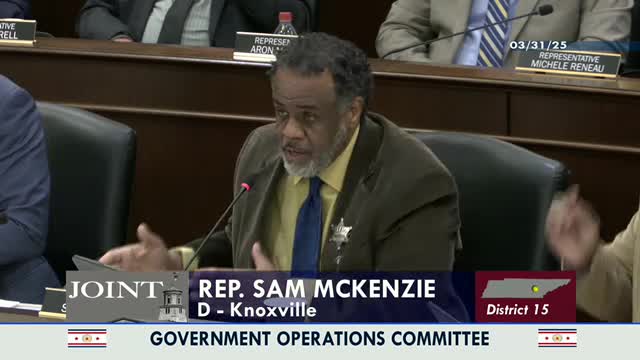Commerce & Insurance updates building codes, adds mobile-food permit and optional daycare consultation
Get AI-powered insights, summaries, and transcripts
Subscribe
Summary
Commerce and Insurance proposed adoption of 2021 construction and life-safety codes, a single statewide food-truck permit, and an optional consultation/inspection service for small daycares in place of full plan submission.
The Department of Commerce and Insurance presented a package of code updates and new procedures to the Joint Government Operations Committee on March 31. Assistant Commissioner Mike Bell and codes director Chris Bainbridge described three main changes: (1) update statewide minimum commercial construction standards from the 2012 code to the 2021 model codes with Tennessee‑specific amendments; (2) adopt permanent rules implementing the statewide mobile-food (food-truck) permit created by public chapter 390 (2023); and (3) offer an optional on-site consultation and inspection package for daycare and educational facilities that enroll 49 or fewer children (the threshold was raised from 24 to 49), intended as a lower‑cost alternative to full plan submission.
Bell said the updated codes are generally less stringent than the 2012 adoption in specific ways while maintaining life-safety protections. The 2021 NFPA 101 adoption creates an exemption for small residential board-and-care facilities (eight or fewer residents) from sprinkler requirements if the operator confirms residents can evacuate to a safe place as a group within three minutes.
The mobile-food unit rule implements the 2023 law establishing a single statewide permit so food trucks need not obtain separate permits in each county. The daycare consultation option carries a $1,000 fee that includes an initial consultation and up to three construction inspections and one final inspection; additional inspections are priced at $1,160. Department staff said the consultation is voluntary and is intended to reduce front‑end cost and delay for owners who either would otherwise submit plans or hire design professionals.
Committee members raised questions about timing and consequences for exempt local jurisdictions that do not meet the new metrics for plan review and inspections (rule requires exempt jurisdictions to complete 80% of plan reviews within 30 days and inspections within 30 days). Bell said a jurisdiction that repeatedly fails to meet the metrics could lose its exempt status. Members also asked about daycare classroom exterior‑door requirements and appeal processes; staff said requirements are code‑specific and that the office will work with affected providers individually to identify economical alternatives and that an appeal process for code interpretations exists.
Committee action The committee advanced the codes and daycare-consultation items with positive recommendations (House voice votes; Senate roll-call tallies recorded in the meeting).
